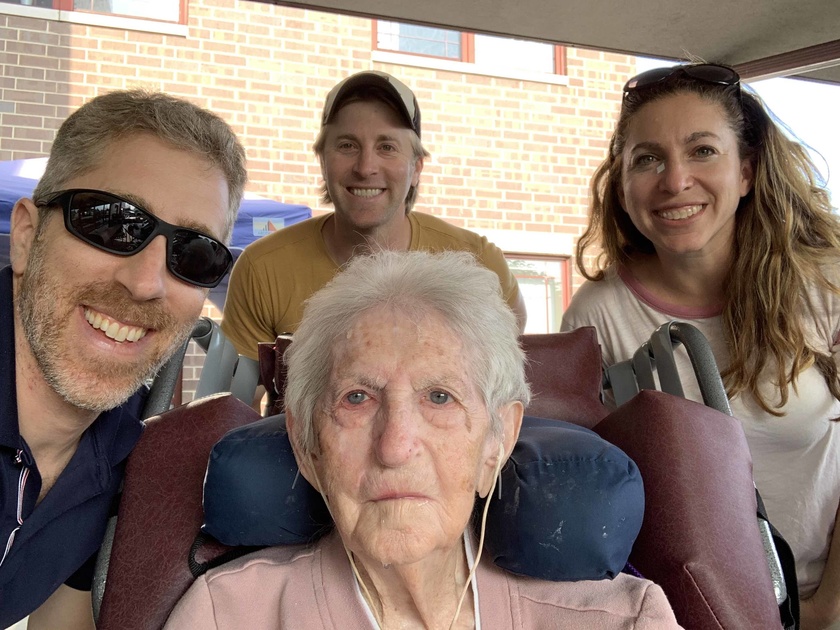My grandmother, Esther Perkel (née Lampert), passed away early this morning.
There's so much to say, so many feelings to sort through. The children will be sad when I tell them. But that, in itself, is amazing: they knew, and had a loving relationship, with their great-grandmother -- a bond that transcended the enforced separations of COVID. My grief is accompanied by gratitude that we were able to overcome so many obstacles to see her this past summer.
I will share a bit of Talmud that is relevant, and which I studied just yesterday. The rabbis discuss the moral imperative of charity, and declare that kindness is an even greater virtue. Why? One reason is that charity involves money, while kindness can involve money and a personal relationship. Another reason is that charity benefits the poor, but kindness can benefit the poor and the rich. Finally, charity is for the living, but kindness is for both the living and the dead, whom we can show kindness by honoring them in burial and in memorials.
The lesson resonated with me -- not because my grandmother was fading, but because she was able to show kindness to my children, just last month, at the age of 101, with nothing material to give them, with the simple joy of her words and her smile and her love. So many people have been deprived of the chance to share those last moments with loved ones during this pandemic. I feel lucky and I will always cherish the memories we were able to create. Death is the way of all life, but I regard this as an example of God's enduring goodness -- the more so as the Hebrew date of her passing is 18 Elul, "Chai Elul," a special date on the calendar, with the number 18 representing the Hebrew word for "life."
I should add this: I remember, as a child, visiting Esther and my grandfather, her beloved husband, Abe, in South Africa. I remember her tears at the airport as she said goodbye to us, not knowing if she would see us again. She was then in her mid-sixties, and she and Abe would join us in the U.S. just a few years later. Grandpa Abe -- a great, kind, wonderful man -- passed away in 1989, and was dearly missed, but Esther went on to live another 32 years, working until her mid-eighties and enjoying the growth of her family around the world. I think of those tears at the airport: could we have known that we still had so much joy to share, that we would be together again? I pray that the tears of today herald a reunion in God's loving arms, one day, after this beautiful life must fade.

This week’s portion launches the great story of Abraham, who is told to leave everything of his life behind — except his immediate family — and to leave for “the Land that I shall show you.”
There’s something interesting in the fact that Abraham is told to leave his father’s house, as if breaking away from his father’s life — but his father, in fact, began the journey, moving from Ur to Haran (in last week’s portion). His father set a positive example — why should Abraham leave him?
Some obvious answers suggest themselves — adulthood, needing to make one’s own choices, his father not going far enough, etc.
But I think there is another answer. Abraham (known for the moment as Abram) needs to establish his own household. This is not just about making one’s own choice, but really about choosing one’s own starting point. It’s starting over.
Sometimes we start over in fundamental ways even if much that surrounds us remains the same. Sometimes the journey we have to ...
The story of Noah is familiar; the details, less so.
Noah is often seen as an ambivalent figure. He was righteous -- but only for his generation. What was his deficiency?
One answer suggests itself: knowing that the world was about to be flooded, he built an Ark for the animals and for his own family -- but did not try to save anyone else or to convince them to repent and change their ways (the prophet Jonah, later, would share that reluctance).
Abraham, later, would set himself apart by arguing with God -- with the Lord Himself! -- against the destruction of Sodom and Gomorrah, saying that they should be saved if there were enough righteous people to be found (there were not).
Still, Noah was good enough -- and sometimes, that really is sufficient to save the world. We don't need heroes every time -- just ordinary decency.
Hi all -- as I noted last month, I'm going to be closing down my Locals page, at least for tips and subscriptions -- I may keep the page up and the posts as well, but I'm no longer going to be accepting any kind of payment.
Look for cancelation in the very near future. Thank you for your support!












